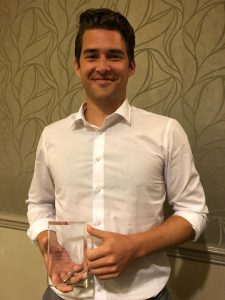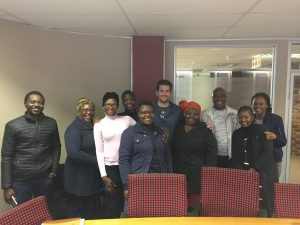“Imposter syndrome is a real thing.”

The Class of 2019’s Austin Oberlin wins the Young Investigator Award at the Infectious Disease Society for Obstetrics and Gynecology’s 2018 annual meeting for his work in South Africa as a Fogarty Global Health Fellow.
In August 2017, the Class of 2019’s Austin Oberlin had just received a prestigious Fogarty Global Health Fellowship. Chosen from a national applicant pool, he was one of seven doctoral trainees selected to spend one year abroad conducting research through the UJMT Fogarty Consortium.
He headed to Johannesburg, South Africa, in August 2017 as a step toward his dream of working in global health. Yet when he arrived, his initial excitement dwindled.
“I felt very out of place,” Oberlin says. “I kept wondering, ‘am I really supposed to be here’?”
While he had taken a year off from medical school to complete the fellowship, many of his Fogarty counterparts around the globe already had earned their Ph.D.s, with completed research projects under their belts. So he turned to his principal investigator and mentor, Carla Chibwesha, M.D., M.S.c., an associate director with the consortium.
“You’ve made it through three years of medical school,” she told him. “That tells us you’ll figure it out and will do whatever it takes to get it done.”
Taking her advice, Oberlin threw himself into the research, not being afraid to ask plenty of questions along the way. Two months later, he found his footing. “I can make it through this,” he told himself.
Six months after that, Oberlin launched his primary research project — a study of women’s preferences for cervical cancer screening — and was feeling “really good. It’s all about completing a project from beginning to end. I knew I could get it done.”
Not only did he finish the research project, he also submitted the results to the Infectious Disease Society for Obstetrics and Gynecology’s 2018 annual meeting. A year after arriving in South Africa, he presented his research and took home the Young Investigator Award.
“They chose the best project by a researcher under the age of 40,” says Oberlin, who competed against residents and practicing physicians for the award.
The Fogarty experience reinforced what Oberlin first learned when he traveled to Ghana as an undergraduate — and saw poverty and health care disparity like never before. “I had a desire to do something about it and that thing for me was medicine. If someone is in trouble, you can change somebody’s life right there with the proper health care.”

During his Fogarty fellowship in South Africa, the Class of 2019’s Austin Oberlin managed a cervical cancer research team ranging from research associates to nurses to co-investigators.
In South Africa, cervical cancer is the leading cause of cancer death in women. Yet only one-third of women who should get screened actually do, according to Oberlin. The research he completed alongside PI Chibwesha provided insight into the types of testing that may be more desirable to South African women, including same-day test results and a home screening kit.
“I definitely want to incorporate research into my long-term career,” Oberlin says. “I’m especially interested in where the research world and public health intersect.”
As Oberlin begins applying to OB-GYN residencies with a public health focus, he leans on mentors like Chibwesha, assistant professor in OB-GYN at the University of North Carolina School of Medicine, and Siddhartha Dante, M’12, who first met Oberlin on a VCU School of Medicine HOMBRE clinical mission trip to Peru. It was Dante who suggested Oberlin apply for a Fogarty fellowship.
“He took it from there and ran with it,” says Dante, a pediatric critical care fellow at Johns Hopkins Hospital who continues to serve as an HOMBRE volunteer. “That’s Austin in a nutshell. He’s been driven from day one in global health and making a functional career abroad.”
Oberlin is part of the School of Medicine’s I2CRP program, or International/Inner City/Rural Preceptorship, a four-year program for students who declare an interest and commitment to working with medically underserved populations in urban, rural or international settings.
“I2CRP is what sold me on VCU,” Oberlin says. “I hadn’t heard about anything like it at other places. My closest colleagues in medical school are all people from I2CRP and I hope will continue to be long-term connections as we move forward in our careers.”
Oberlin also benefits from the Jason Lee Arthur Scholarship.
“A scholarship is important for someone like me who plans to work in the public sector,” Oberlin says. “I don’t want my biggest concern to be getting out from under loans and taking a particular career track because of money instead of helping as many people who need it as I can.”
Oberlin extends that helpful approach toward mentoring younger medical school classmates, spreading the word about I2CRP and Fogarty whenever he can. “Fogarty was such a transformative experience for me and I want everyone to know it’s available — and attainable. It was a career-defining moment and I want everyone to have access to the same opportunity.”
I2CRP director Mary Lee Magee calls Oberlin a “shining example” in the I2CRP program. “He has worked steadily to foster the knowledge, skills and experiences to make his dream of serving low-resource communities into reality,” she says. “He never misses an opportunity to share what he has learned along the way with other students to shine a light on lesser known career paths and nurture the potential of fellow classmates.”
By Polly Roberts

